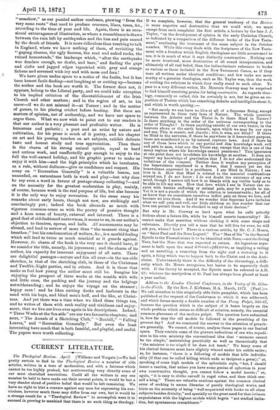CURRENT LITERATURE.
The Theological Review. April. (Williams and Norgate.)—We feel pretty certain to find in the Theological Review a number of able articles, written in a tone of moderation, and with a fairness which cannot be too highly praised, but controverting very directly some of our most cherished convictions. Could all the writers in any one number be held to have made out their several points, it would be but a very slender shred of positive belief that would be left remaining. We have no right to hint a censure against any man for expressing his con- victions, however much these may differ from our own, but it would be a. strange result for a "Theological Review" to accomplish were it to succeed in proving to mankind that there is no such thing as theology.
I If we complain, however, that the general tendency of the Review is more negative and destructive than we could wish, we must except from such complaint the first article, a lecture by the late J. J. Taylor, "on the development of opinion in the early Christian Church, as indicated by a comparison of the different books of the New Testa- ment," continuing the treatment of the same subject in the October number. While this essay deals with the Scriptures of the New Testa-
ment with a freedom which English theologians are little accustomed to use, it is in much of what it says distinctly constructive. _Nothing can be more irrational, more destructive of all sound interpretation, and ultimately of all real belief, than the indiscriminate reference to books so various as those included in the New Testament Canon, as if they were all written under identical conditions ; and few tasks are more worthy of a genuine theologian, such as Mr. Taylor was, than the work of settling the relations in which they really stand to each other. To pass to a very different writer, Mr. Moncure Conway may be surprised to find himself receiving praise for being constructive. As regards theo- logy, commonly so called, this he certainly is not, but he gives an ex-
position of Theism which has something definite and intelligible about it, and which is worth quoting :— "But surely we can have no idea at all of a Supreme Being, except as represented in those very laws of Nature. The whole question between the Atheist and the Theist is, Is there Mind in Nature ? Is there anything in the order of the universe corresponding to the order of Thought ? Is there anything outside of our own brains, in the heavens above or the earth beneath, upon which we may fix our eyes and say, This is cosmic, not chaotic ; this is wise, not blind If there be Mind in the universe, if there be anywhere in it benevolent purpose, these are manifested to us by natural supreme laws. And if there be any of these laws which to our partial and dim knowledge work evil and pain to man, what can the Theist say, except that this is one of the many regions where his knowledge cannot penetrate? This ignorance at one point does not invalidate his knowledge at another. It does not impair my knowledge of gravitation that I do not also understand the variations of the compass. Neither does it weaken my perception of the benevolence expressed in a flower, that I cannot yet see the benevolence expressed in a pestilence. I see Mind in Nature ; I see love in it. How that Mind is related to the material combinations around me, I do not know : I do not doubt the existence of my own mind, though I cannot tell how it so blends with my visible body as to be able to lift my arm. How that love which I see in Nature can co- exist with human suffering or animal pain, may be a puzzle to me. Yet it is not a puzzle of which the solution is inconceivable; for all of us know that we sometimes ourselves inflict pain on those we love, and because we love them. And if we wonder that Supreme Love includes what we call pain and evil, our little children no less wonder that our love can permit them to be checked in any of their desires."
But why is Mr. Conway so hard upon what he calls priestly fictions about a future life, while he himself asserts immortality? He cannot make that assertion without clothing it with some shape and substance. Directly you tell a man that he will live for ever, he will ask you, where? how ? There is a curious article, by Mr. C. J. Monro, on "Saint Paul and the Nero Legend." The "Man of Sin "in the Second Epistle to the Thessalonians is to be identified with Nero,—not the living Nero, but the Nero that was expected to return. An ingenious argu- ment is built upon the word riTozotXup9no'sTal, as implying a veiling and an unveiling, a removing from the sight and a restoring to it again, a thing which was to happon both to the Christ and to the Anti- christ. Unfortunately there is the difficulty of the chronology, a diffi- culty which Mr. Monro recognises, but leaves to be separately dealt with. If the theory be accepted, the Epistle must be referred to A.D. 69; whereas the martyrdom of St. Paul has always been placed at least a year earlier.


































 Previous page
Previous page